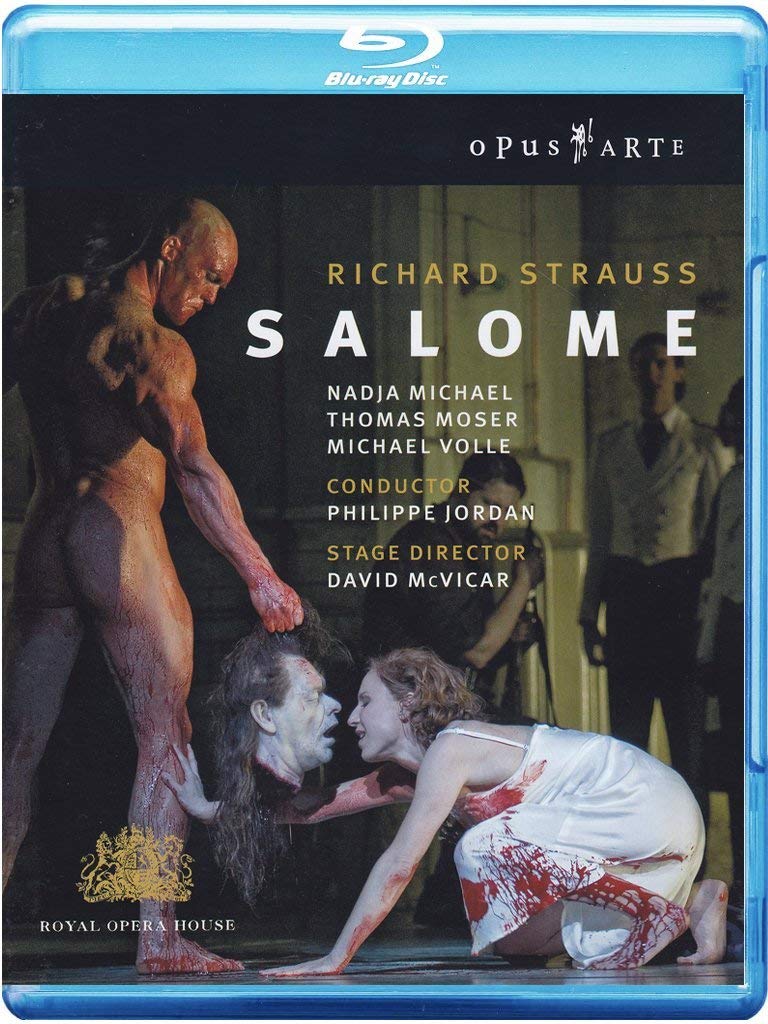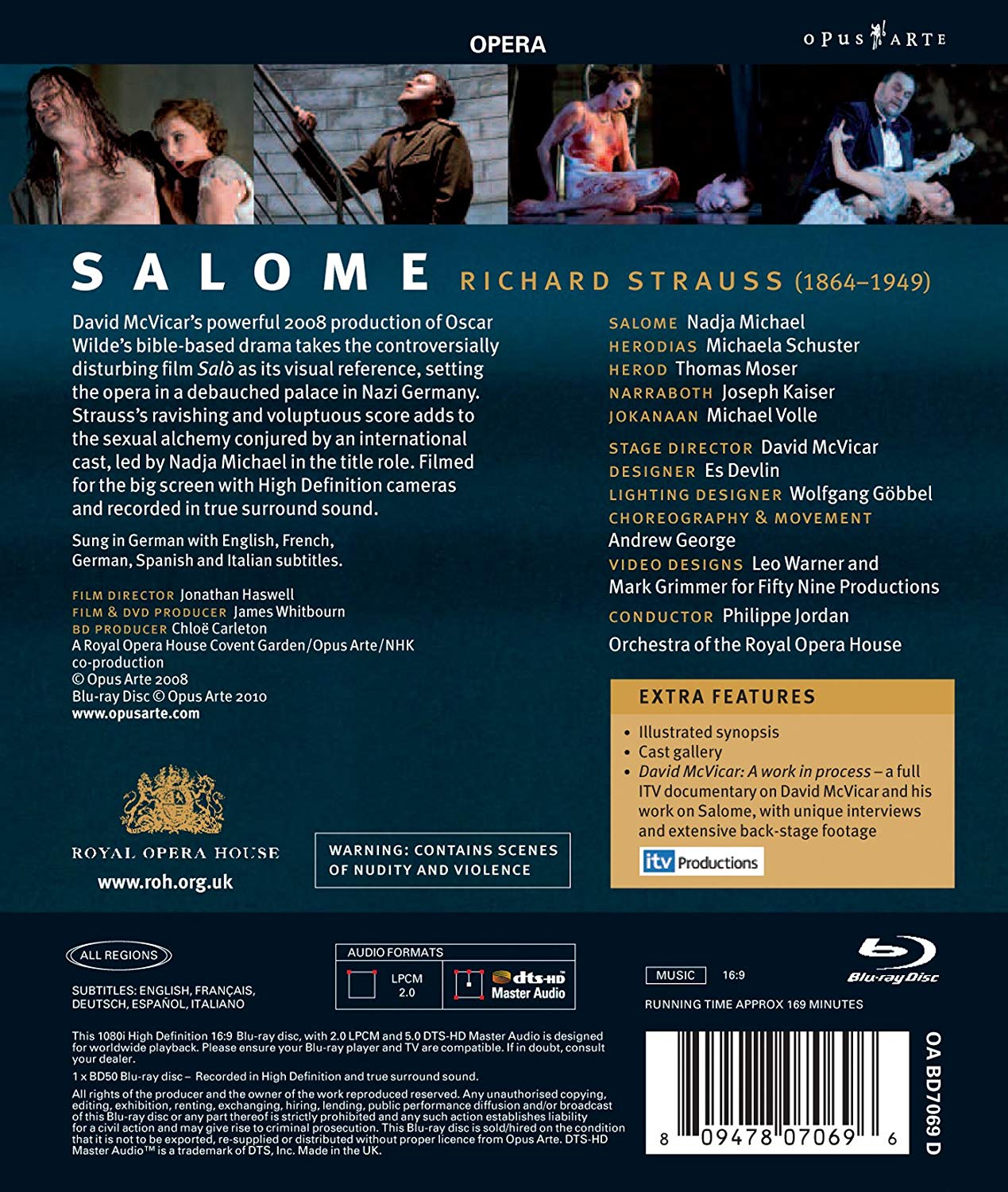

Richard Strauss Salome opera to a libretto from Hedwig Lachmann's German translation of Oscar Wilde's play Salome. Directed 2008 by David McVicar at Royal Opera House. Stars Nadja Michael (Salome), Michaela Schuster (Herodias), Thomas Moser (Herod), Michael Volle (Jokanaan), Joseph Kaiser (Narraboth), Daniela Sindram (Page to Herodias), Christian Sist (First Soldier), Alan Ewing (Second Soldier), Vuyani Mlinde (A Cappadocian), Pumeza Matshikiza (A Slave), Adrian Thompson (First Jew), Martyn Hill (Second Jew), Hubert Francis (Third Jew), Ji-Min Park (Forth Jew), Jeremy White (Fifth Jew), Iain Paterson (First Nazarene), Julian Tovey (Second Nazarene), and Duncan Meadows (Namann the Executioner). In addition, stars actors Kenneth Bryars, Andrew Carter, Peter Cooney, Trevor Goldstein, Sam Guttman Hancocks, Irene Hardy, Nathan T Heys, Pano Masti, Lee Mathieson, Frances Milar, Emma Reed, Anna-Marie Sullivan, and Sirena Tocco. Philippe Jordan conducts the Orchestra of the Royal Opera House (Associate Concert Master Sergey Levitin). Designs by Es Devlin; lighting by Wolfgang Göbbel; choreography by Andrew George; video designs by Leo Warner and Mark Grimmer. Directed for TV by Jonathan Haswell. Sung in German. Released 2010, disc has 5.0 dts-HD Master Audio sound. Grade: A-
Because it deals with incest, child abuse, juvenile sexual depravity, murderous brutality, necrophilia, and cannibalism, Salome has always been probably the most controversial of operas in the canon. It takes great singing and acting, a superb orchestra, taut directing, and expert stagecraft to keep Salome under control. In this production, McVicars was able to put it all together.
The Bible story from Matthew and Mark is sketchy but puts the blame mostly on Herodias, Herod's wife. When her daughter Salome pleased Herod and his guests with a dance, Herod made her his famous ill-advised offer. The girl consulted with her mother, who ordered her to ask for the head of John the Baptist. The real Salome (who per historians lived for a long time after the death of John), probably would have much preferred a gold necklace. She may have sensed that her mother was going to ruin Salome's reputation. But she couldn't have grasped that she would be remembered thousands of years later as the symbol of juvenile depravity engendered by growing up in an atmosphere of sexual licentiousness.
In the opening scene we see the kitchen and resting areas for Herod's servants. McVicar moved the setting from Biblical times to the time between WW I and the end of WW II. Instead of foremen and slaves, policemen and inmates from prisons serve Herod. This 1940 look is apt since Salomeic atavistic depravity was a hallmark of the police states of that time in both Western and Eastern Europe.
The soldiers are guarding both Herod and John the Baptist, who is confined in a cistern under the floor. Herod is having a birthday party in the stateroom above. The guests are getting drunk arguing about politics and religion. The naked woman is is one of several kept ready in case Herod calls for a special birthday present. A guard complains, "Who are these wild animals howling upstairs?"
Salome (Nadja Michael) leaves the party and slums into the kitchen because she is curious about the strange prisoner under the kitchen floor. She gives fair warning about her motives when she asks, "Is this prophet an old man?"
Nadja was born in then East Germany. As a child, she was a swimmer in the infamous East German sports system. When the coaches wanted to give her steroids, her parents pulled her out, and she eventually escaped to the West. She has apparently always been a fitness nut—at about age 39 (in 2008) she was rail thin, flexible and mobile physically, looked like age 27, and was able to portray a girl of 17. Though small and lithe, she can sing accurately over the 116-piece Straussian band. Further, she can act with big gestures to the live audience and small-scale facial expressions and moves that make her terrifying in high-definition close-up shots.
Here Salome orders the captain in charge to break orders and let her talk to the prophet. She says, "His eyes are the most terrifying thing about him."
Salome knows the prophet is a holy man who is causing trouble for her mother and step-father. She probes his thinking, and asks, " So then tell me what I should I do."
John tells her to seek out the "Son of Man," meaning, of course, Jesus. Salome asks, "Who is that, this Son of Man?" But you can see that Salome is not really interested in theology. She wants to seduce John:
She presses forward, "Nothing in the world is so white as your body."
"Let me kiss your mouth."
Since Salome refuses to return the the party upstairs, Herod moves the party downstairs. it's time for dancing, but Salome says she doesn't want to:
But when Herod offers her anything she wants if she will dance, Salome reconsiders. Strauss wrote a "Dance of the Seven Veils" even thought the Bible says nothing about the dancing except that it pleased Herod. Many productions of the opera call for a striptease, and then the question becomes how much the soprano will take off. According to reports on the Internet, Nadja is, in addition to all her other glories, also an excellent dancer. So observers were expecting something pretty salacious from McVicar and Michael. No way. In this show, Salome puts on more clothes than she takes off and only dances a (rather elegant) little waltz with Herod. But Salome knows what Herod wants. At the end she lifts her skirt for him:
The dance scene is private. Eventually, Herod appears bursting with pleasure at his new experience of having sex with his step-daughter. "Marvelous!" he declares:
Salome staggers out later, barely able to stand up after taking on the bulk of an aggressive man almost three times her weight. She has given 100% in performing her end of the contract. Herod says: "You see, she did dance for me, your daughter."
Herod had promised up to half his kingdom. He was so relieved when Salome first mentions the silver platter, a rather small object compared to a kingdom. "So what is it that you want on the platter?" asks Herod:
You know the hideous answer. Herod is trying to protect Jokanaan because he is popular in the countryside. He begs Salome to revoke her demand, but Salome repeatedly insists. Here she says "I want the head for my own pleasure" to explain that's she's not following any instruction from her mother:
Herod gives the order of execution, and Salome eagerly waits to hear Jokanaan's scream:
"John, you didn't want to let me kiss your mouth."
But now Salome has earned that kiss and will have it:
Salome takes on the disconnected look of someone who is criminally insane. In voiceover, Herod say, "Sie ist ein Ungeheuer, deine Tochter. (She is a monster, your daughter.)"
I don't show you the kiss because it makes for a bad photo. Salome exults in her reward for having sex with her step-father. Even her mother realizes the truth of Herod's assertion that Salome is a monster:
In horror movies, any girl who enjoys sex along the way must surely die. In this production, the naked executioner, on order of Herod, breaks Salome's neck to bring the opera to its end.
Salome is almost a one-person show. But Thomas Moser realistically portrays Herod in combining the swagger of a tyrant with the nervousness of one who has keen insight into his own weaknesses. Michaela Schuster is utterly disgusting as Herodias. Michael Volle sings beautifully as Jokanaan. All the supporting singers are excellent. The orchestra plays as if they were afraid Philippe Jordan might throw them into the cistern. When this was shot in 2008 it was one of the early great HDVDs. But in 2020, PQ is soft, the colors don’t seem as vivid as they once did, and the sound recording now seems muddled.
We continue to praise another excellent feature of this Opus Arte disc--- the German language subtitles. For Strauss, the orchestra was the star. The singers had to swim or sink. The German libretto to Salome is straight-forward German prose that is easy for me understand as written text. But trying to make out where the singers are in the libretto during performance is dauntingly tricky. Long ago, in a determined effort to learn Salome, I bought the Brigit Nilsson version with Georg Solti and the Vienna Philharmonic on London LPs. Included in the set was a beautiful full libretto in German and English. Alas, I could never follow the libretto from the recording.
The Opus Arte HDVD is vastly superior to the LPs. This improvement is independent from the tremendous help you get in understanding the singing from seeing the action in the video. After watching the Opus Arte disc 4 times, I could follow every word of the singing in real time if I had the German subtitles on. When I had the German subtitles off, I could follow about half the words. Finally I went back to the LPs again---I still could hardly understand a word.
We are grateful to Opus Arte for including subtitles in the language being sung on the disc. Many opera producers don't do this thinking that native speakers don't need the help. But opera recordings will be used by huge numbers of non-native speakers who benefit greatly from native-language subtitles. So we say this to all you opera producers out there: Please always include in your package good subtitles in the native language on the disc.
Time to sum up: we graded this A+ back in 2010. We still admire Nadja for decent singing and terrific acting. She’s not beautiful, but she has that lean and eager look of a girl who makes up for her plain appearance with sexual aggression. The set, costumes, and personal directing remain outstanding, and this recording set the limbo stick pretty low for competition to come later. But neither PQ nor SQ is up to date, so we now grade this A-.
Here’s an official clip:
OR




















